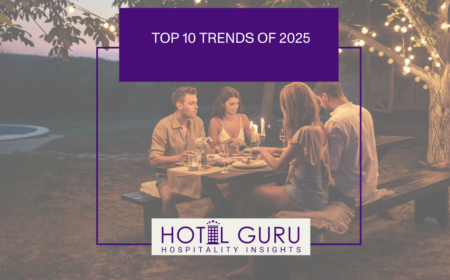Top 10 Trends for the Hospitality Industry in 2025
While we wait for all market segments to return to 2019 levels, we are seeing shifts in the hospitality industry. These 10 trends will shape the next year of guest expectations, technological advancements, and business growth.
Sustainability
1-Sustainability toward a net-zero carbon footprint. It’s not like China and India will start doing these things, but 76% of today’s travelers want to do business with those who care about the carbon footprint and our environment. Have you ever been to a Coldplay concert? Chris Martin, lead singer of Coldplay, has been orchestrating sustainable, net-zero carbon events for years. The fans love it and even participate by pedaling on stationary bikes. Energy conservation and efficiency are paramount to sustainable practices. Transforming cooking oil into biofuel, adding EV charging stations, and reducing our carbon footprint are becoming more critical for today’s travelers. Most of today’s events and trade shows have a sustainability goal, with 85% of attendees preferring sustainable practices. Most large companies disclose their environmental, sustainability, and governance (ESG) information, though some are due to regulatory requirements.
Artificial Intelligence
2-Next-level or “cutting-edge” artificial intelligence (AI) will enhance customer service, provide hyperdynamic pricing, improve wellness options, and personalize beyond today’s practices. The next generation of AI is already here and being integrated into our technology. Chatbots can handle guest inquiries and sound human! AI is not replacing humans—it enables them to be much more productive and provide improved customer service while it completes mundane tasks. The key is in the prompt—we will get an intelligent answer if we ask a thoughtful question. The hotel and event industries can use AI for facial recognition, voice-activated tools, automated live language translation, smart floor-planning tools and automated task management. AI training is the third-most sought-after learning cited by employees. Leadership and Wellness were 1 and 2, respectively.
Personalization
3-Hyperpersonalization via Virtual Reality (VR) and Augmented Reality (AR) once we’ve acquired an opt in. We can leverage owned channels, like email and SMS, which give us more control, meet personalization expectations, deliver better ROI, and ultimately provide more opportunities to build relationships with our customers and prospects. This might include custom room amenities, tailored entertainment options, virtual reality tours, and AI-generated artwork or music. With the rise of remote work, hotels should offer packages that combine leisure with work-friendly amenities. Smart rooms and IoT (Internet of Things) integration are transforming the hospitality industry by enhancing guest experiences and improving operational efficiency via voice-activated commands to control room features like lighting, temperature, integrated entertainment systems, and mobile apps.
Health and Wellness
4-Wellness – Nutritious menu items, new yoga mats or exercise equipment, new educational programming, food and beverage events, and a spa or relaxation experience are all good starts. Food and Beverage Innovation, like offering unique and locally sourced food and beverage options, will attract food enthusiasts and support local communities. Nutritious meals and breaks in the meeting facilities and restaurants will get positive feedback. More and more guests want a healthier lifestyle when they travel. Encouraging movement, whether for a meeting, event, or individual travelers, will result in happier guests and attendees. Fitness now extends to recovery amenities such as white noise sleep aids, intravenous vitamin drips, and digital technology treadmills. Further, employees are very interested in wellness and mindfulness training.
Improving Profitability
5-Profitability by driving revenues with enhanced AI, revenue management, sales call tracking, and ancillary revenue creation, like adding healthier snacks in the lobby shop; Cutting expenses like energy, insurance, food, and labor (robotics, chatbots) and improving tax strategies. Biometric check ins and facial recognition for room access will enhance security and streamline the guest experience
while saving “check-in” labor. Voice-activated controls and smart devices in rooms will become more common, allowing guests to easily control lighting, temperature, and entertainment systems while saving energy. Robotics can enhance efficiency, reduce operational costs, and engage with guests. They can vacuum, deliver supplies, food, and beverages to rooms, and provide AI-enhanced customer service.
Deal Flow and Capital
6-Deal Flow and Capital will improve with lower interest rates, debt maturity, construction, renovations, sales, and refinances. Today’s market has over $100 billion in hotel debt maturing by the end of 2025. These loans are commercial mortgage-backed securities (CMBS) at low interest rates (4.5%+/-). Future buyers might prefer the “Moneyball” approach to hotel management and use more technology and fewer employees. With construction costs increasing, new supply will continue to be muted. Project start dates for construction and renovations are difficult at best. Supply-chain issues are not as bad as 2020-2022 but not good. 2025 might be remembered as the year of the deal.
Generational Shift in Travel
7-Tipping Point of Generations – there is a quantum shift from baby boomers and Generation X to Generations Y and Z. Brands are responding with more products, short-term rentals are competing more favorably, cruises, glamping, yurts and even the soft brands are competing with different and tech-savvy features. With the leisure market dropping off and corporate, group, and international business picking up the slack, these new guests prefer photo ops to the “no surprises at Holiday Inn” or the “consistency” of many brands today (that’s better than using the words “cookie-cutter.”) The expression, “this is not your father’s Buick” may resonate with people my age. Take note that today’s traveler is changing right now.
Trust, Ethics, and…
8-Storytelling is arguably the most persuasive sales tool in the toolkit. Every product needs a story, and today, a robot, AI, AR, VR, or any innovation can create a great story. So can trust and ethics—karma works when we repeatedly do the right thing. This past weekend, I trusted my airline and hotel, but my travel plans fell apart. I was flying to New York for a wedding, and my flight got canceled. There were no other flights since it was Labor Day Weekend. I tried to cancel my hotel room since I couldn’t get there. I ended up renting a car and driving to my destination, meaning I had no sleep before the wedding. Do I look that bad? It was this past weekend! Bottom line? The hotel accepted my cancellation, the airline reimbursed me for the trip, and I was on time for the wedding: trust, ethics, a bit of lost sleep, and some extra driving. And think about this presentation—we are telling a story supported by the data, not showing you the data, and hoping for engagement.
Digital Nomad Effect
9-Remote Work is here to stay in some form. This impacts business travel in a big way. While a healthy work/life balance for employees is good in many ways, it reduces travel and increases Zoom, Teams, or Google Meet calls. This hybrid or remote work changes the culture nurtured in yesterday’s corporate headquarters. It also changes the strength of the midweek when it comes to occupancy. The combination of leisure travelers and remote workers makes weekends stronger than midweek.
Women in Hospitality are Making Waves!
10-Women in Hospitality is a trend; have you noticed? There are more women in both operations and senior roles than ever before. In 1980, there was that rare woman in hotel operations. Most were in sales. Today, 58% of the hospitality workforce are women, and 34% of the leadership jobs in hospitality are women. While there remains a gap, groups like the Castell Project, San Diego’s Women in Tourism & Hospitality, and San Diego’s employers are narrowing that gap. This is all part of the shifting diversity of hospitality employees and executives. People of color represent 51% of hotel front desk jobs (split 50/50 between Black and Latino) but only 14% of leadership positions. That is all changing!
These 10 trends are shaping the 2025 outlook of the hospitality industry. While some of these trends are similar to my 2024 outlook, many shifts are still occurring so it is more important than ever to stay ahead of the curve.




